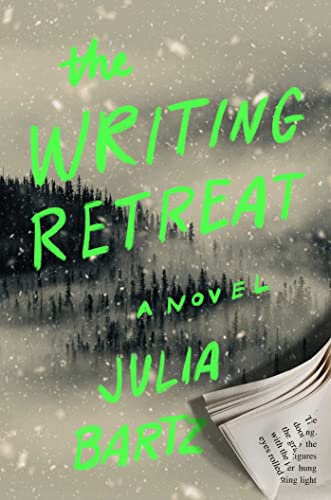The Writing Retreat: A Novel

“The book, told in . . . first person, is heavily plotted and—like the house—full of secret passageways and red herrings.”
All would-be authors dream of invitations to subsidized writing retreats, but Alex wins the lottery: She scores a one-of-four ticket to a month-long encounter with her favorite author in the world, bestselling Roza Vallo. One of the four, all women writers under 30, will get not only Vallo’s mentorship but a big-ticket book contract.
The catch is that Alex’ onetime best friend, and now her sworn enemy, is also among the four. They’re even slated to share a room at Vallo’s secluded and somewhat macabre rural New York manor house, Blackbriar, where some mysterious spiritualism-related deaths occurred in the late 19th century. Is the stage set? You bet it is. Doors will creak, lightning will crack, snow will fall, guns will be stashed, menace will occur, people will disappear—and then reappear.
The Writing Retreat is full of horror tropes, but judging from the volume of haunted house books and movies, consumers can never get enough of them. This isn’t We Have Always Lived in the Castle, but it’s a fairly good representative of the genre.
Julia Bartz describes herself as “a feminist, sex-positive, social justice-oriented therapist” whose aim is “to help clients learn more about themselves and figure out how to build a more authentic and fulfilling life.” This is her first work of fiction, but the aim is a bit different from her therapy. She simply wants to create a great read, and there’s not a lot of feminist solidarity in the book. It’s a given in gothic books like this that the characters are not who they seem, but here the personality turnarounds are pretty dramatic.
It's plain right off that Vallo has an agenda that goes beyond the bestseller list. The full dimensions of the character and her creepily devoted Addams Family staff will become clear eventually, and it’s quite whacked out.
Most of the book takes place at the retreat and, as the women get to know each other, alliances will be formed and broken. Alex’ former bestie, Wren, will take on various forms and identities, though some of them are it-was-only-a-dream fakeouts. Revelations and supernatural events will occur, and all the while Vallo is guiding her young charges through some increasingly outré exercises.
The book, told in Alex’ first person, is heavily plotted and—like the house—full of secret passageways and red herrings. Just about everyone is concealing something. Saying anything more about the story will risk spoiling the fun. But if some of the dialogue is a bit overripe and the situations occasionally (OK, often) implausible, the book never offends to the point where the reader want to throws it across the room. Burn it to keep warm, maybe.
Books and films about writers have a challenge: Writing is boring. It’s someone sitting in a room, at a desk, typing away. So authors and directors mostly give us the life, not the writing. To Bartz’ credit, this one really is about writing. In fact, the four writers are competing against each other to turn out a great work of fiction—so they’re writing in their rooms all day. Critiques of the finished chapters take up a fair amount of space.
That said, the winning novel—which gets tossed into the fire at one point—doesn’t really seem like chart-topping material. But maybe you had to be there—at Vallo’s Blackbriar, with possibly poisoned food and malice lingering behind every door.